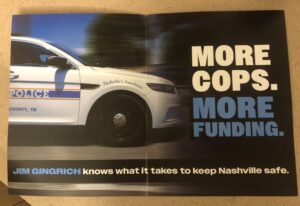
Systemic racism has caused uneven poverty, incarceration, educational achievement and health outcomes in Nashville.
What is the next mayor planning to do about it?
The people who want the job struggled to give answers at a forum put together by Nashville Organized for Action and Hope, or NOAH, on Sunday.
 Caroline Eggers WPLN News
Caroline Eggers WPLN NewsNashville for Organized Action and Hope held a mayoral forum at Fifteenth Avenue Baptist on July 9, 2023.
“We have to do better,” said Sen. Jeff Yarbro, D-Nashville, during the allotted 60-second timeframe to answer.
All of the candidates acknowledged that systemic racism exists in Nashville. Two candidates, Matt Wiltshire and Vivian Wilhoite, said they would make Metro departments more diverse.
Others offered statistics. Most gave examples of what they have done in their current jobs. A few people emphasized talking about racism.
“Call these things out,” said Sen. Heidi Campbell, D-Nashville.
“Talk about it first,” said Stephanie Johnson, who added that she had individual agendas for different races and populations. “If we want to talk about racism, we have to talk about the issues that systematically are hurting … groups.”
The candidates did not list any other potential mayoral actions.
It did not go unnoticed.
“Listen closely so that you answer the question that is being asked,” Rev. Judy Cummings, a NOAH volunteer and moderator at the forum, told the panel.
The forum was held at one of Nashville’s oldest Black churches, Fifteenth Avenue Baptist. It sits on the invisible line between Germantown and Buena Vista, offering a reflection of the city’s racial disparity.
Germantown is 83% white, nearly 60% of households make at least $75,000, and 49% of the people have a Bachelor’s degree. Buena Vista is 77% Black, 72% of households make less than $25,000 a year, and 10% of the people have Bachelor’s degrees, according to Niche.
These two neighborhoods, make up part of the 37208 ZIP, which a 2018 study found had, at one point, the highest rate of incarceration in the nation.
“We are still repairing the harm of that mass incarceration,” Councilmember Freddie O’Connell said during his remarks, calling attention to how the city removed some “jailer’s fees” in 2018.
 Caroline Eggers WPLN News
Caroline Eggers WPLN NewsJim Gingrich is mailing an ad with the slogan, “More cops, more funding.”
Cities have the ability to invest in neighborhoods through “opportunity zone models” and adapt urban greenspaces to specific community needs and minority experiences. Most recommendations to address structural racism through local government include calls for criminal justice reform.
Jim Gingrich, who recently sent a campaign mailer with the slogan, “More cops, more funding. Jim Gingrich knows what it takes to keep Nashville safe,” has plans to hire additional police and equip them with “state-of-the-art equipment.”

